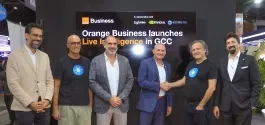-
Expertise
Digital infrastructure
Employee experience
Customer experience
Operational experience
Data & AI
-
Solutions
Data, AI & IoT
Internet and networks
Fixed-line and VoIP telephony
Mobility
Collaboration and remote working
Security
Cloud
Customer experience
Consulting and digital transformation
-
Customer stories
The latest
-
News and events
-
About us
Press
Here you’ll find press releases and other news and information about Orange Business Services.

Orange Business Services

Orange Business Services reaffirms its brand positioning through a new communication campaign

GÉANT selects Orange Business Services as its trusted cloud service provider for pan-European educational and research ecosystems

Reimagined supply chains emerge from global crisis as enterprises focus on data insights to mitigate risk

BNP Paribas joins forces with Orange Business Services to deploy SD-WAN for 1,800 retail sites in France

Orange is mobilised to ensure continuity of service for all customers, in France and around the world

A trusted multi-cloud service strategy
Contact sales
Our local offices



